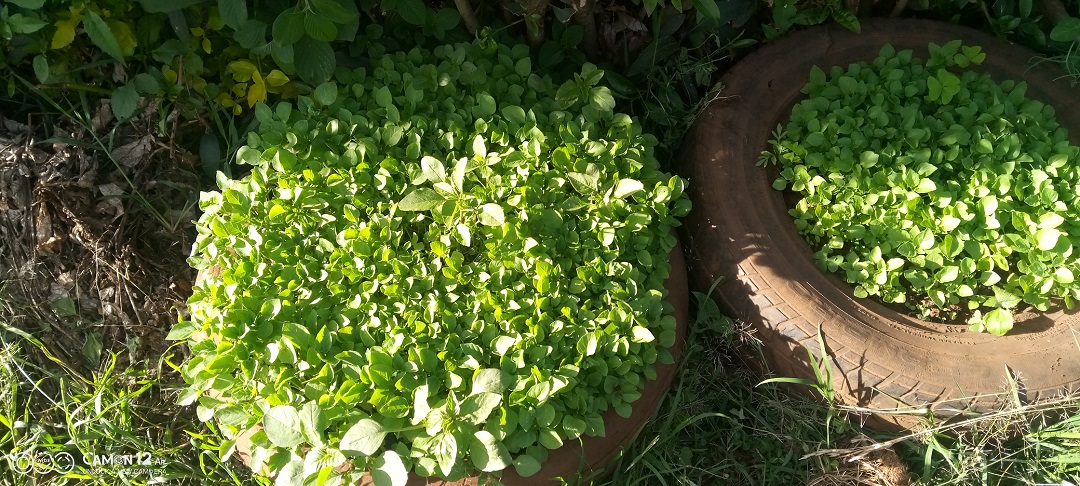By George Munene
On a 40*100 piece of land you can harvest up to 300 kilograms of managu every week selling at Sh30 per kilogram; this can earn you a cool Sh9000 in a week.
Having grown managus on a trial basis for home consumption at her back garden in Limuru, Mary Ikigu started commercialy farming the vegetable commercially at the beginning of the year on some 100 disused mushroom growing bags. This she attributes to having found the crop highly marketable, particularly given Kenyan’s newfound love for mboga za kienyeji and it being a resource-efficient crop in its production; does not need to be grown in specialized conditions, i.e. greenhouses, a 5000-liter water tank that ensures access to irrigation water is all Mary recommends. A farmer will also need to cost for manure and part-time employees to help with land preparation, weeding, harvesting and watering depending on the size of their farm.
With what is considered limited farming space; half an acre to 50*100 sized plots; managu farming can be a money minter given access to the right market linkages. The larger your farm size the more its harvest and profit potential. The nutrient-rich vegetable can as well be grown in vertical growing bags. A farmer she says can strategically divvy up their land into plots to make sure they have constant harvests.
Related News: Processor guarantees prices for organic and traditional outgrowers
Related News: New international markets opening up for African vegetables
“Managu is sold in markets in a bunch; a handful for about Sh10 or per kilo, with a kilogram, usually fetching Sh30-40. They are also packed and sold in sacks. As with most other crops, it is a numbers game; the more harvests you have the more you are able to sell,” Ikigu explains.
Managu prices in Kenya are usually dictated by rain patterns: they grow faster and are readily available in markets during rainy seasons; their prices are therefore lower. “You’ll sell managu for Sh2000 a sack during the dry season, over the January to March months the market has thus far been great, but the price can crater to as low as Sh500-300 when rains hit because most farmers depend on rainfed agriculture and are able to grow it as well,” the budding farmer says.
The main markets for managu in Kenya are open-air markets. These include Muthurwa, Kawangware, Kangemi where she takes her produce or has buyers come from to pick the leafy vegetable from her farm. Others are City Park in Nairobi where most buyers, some of whom are Chinese nationals, prefer improved rather than Kienyeji managu which is less bitter. Mary points out that Farmers can also target more structured markets such as learning institutions, restaurants, hospitals and mama mbogas within their locality.
African Nightshade should be harvested early in the morning or late in the evening. The crop’s leaves deteriorate easily when picked when it is sunny this makes them less appealing to buyers depreciating their value.
A crop can be continuously picked for two months, but the harvesting period can be increased by adding manure every two weeks after weeding. Ratooning; cutting off of the main stalk up to 15-20 centimeters also allows for the plant to develop new shoots extending the harvesting time. This Mary says will however also lead to reduced yield thus she opts to replace her existing crop.
From Mary’s experience, the pests affecting managu are often aphids and mealybugs. Given her crops are organically grown she tackles them using neem oil. “If your crop has suffered a pest attack you should spray them once a week. To prevent such attacks, I keep to a regiment of pro-actively spraying my vegies every two weeks,” she says. This also involves spraying them for fungal attacks; Managu are of the Solanaceae family thus are easily afflicted by late and light blight; using Regain a biological fungicide manufactured by Real IPM.
For her planting material, she sows seeds picked off her shrubs or buys them from Simlaw or Kenya seed. Managu takes 45 days to grow in her nursery and one to two and a half months before the vegetable’s first harvest depending on the level of agronomic management. Seedlings are transplanted when they are 15cm long/ after 30-45 days or when they have five true leaves. The plant distance should ideally be 30*30cm. On her vertical farm bags, Mary fits two seedlings into every bag

Manure is essential in providing the vegetable with Nitrogen, Phosphorus, Potassium and micronutrients; managu will often naturally grow in areas that are heavily fertilised such as cowsheds. For her bags, Mary uses two buckets of chicken manure and 8 bucketfuls of cow dung.
Managu requires a moisturized environment to thrive with their quantities falling in Kenyan markets over drier months when they fetch a premium price. Watering should also be done at transplanting to improve the survival chances of the plantlets.
“The land prepared in readiness for panting should be finely tilled ensuring the soil is fine enough to hold the plant’s seedlings which are very tiny. The seedlings are encumbered in their germination by compacted soil, taking longer to grow in soils with hardpans,” she says.
Managu does best in soils with a PH of 5.5-6.8 but can grow in various soil types given proper agronomic practices are conducted, i.e, manuring, watering and frequent weeding.
Given the crop’s early success, Mary is planning on expanding her space under managu and cultivate the vegetable not just in her vertical garden. Besides managu, she also commercially grows strawberries, celery, spring onions, parsley, amaranth and kunde.
You can check out her journey, and pointers on how you too can tap into this lucrative agribusiness here: Mary Ikigu_Thefarmgirlke